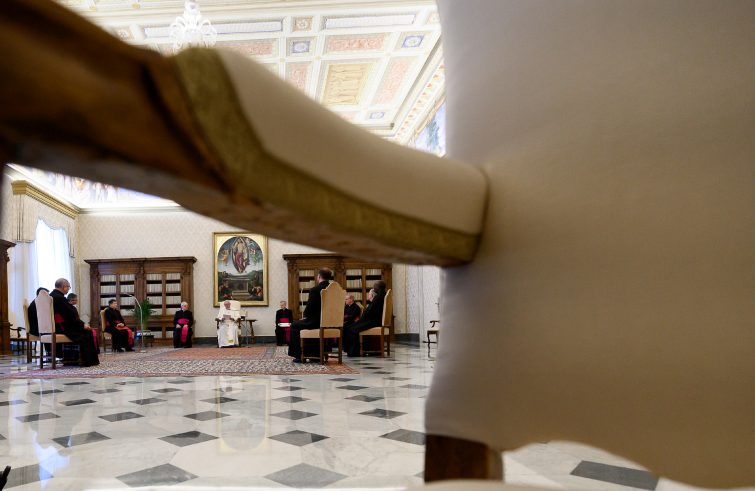
“Despite the precautionary measures to prevent the spread of coronavirus infection, may this be a time of serenity, enjoyment of the beauty of creation and strengthening of ties with us and God.” It’s the Pope’s wish for the upcoming holiday season expressed in the greetings that by tradition conclude the Wednesday General Audience, livestreamed from the private Library and devoted to the figure of King David, of whom Jesus is a descendant. David is “first of all a shepherd”, the Pope said: “his conduct is different from that of a mercenary”. Thus, when the prophet Nathan reproaches him for his very serious sin, “David understands right away that he had been a bad shepherd, that he looted another man of the only sheep he loved, that he was no longer a humble servant, but a man with a thirst for power, a poacher who looted and preyed on others.”
“When a person lacks that poetic dimension, their soul is crippled.”
Francis added in unprepared remarks introducing the second distinctive trait of the figure of David: his poetic soul, which according to Biblical tradition has made him “the great author to whom we owe the composition of the psalms.” “David was not a coarse man, as may often happen to individuals forced to live isolated from society for a long time”, is the portrait at the heart of the audience. In fact he is “a sensitive person”, the Pope went on, “one who loves music and songs. The harp always accompanied him: sometimes to raise a hymn of joy to God, other times to express a lament, or to confess a sin.” “The world that stands before him is not a silent scene. Behind the unravelling of events, his gaze grasps a greater mystery.” “That’s where prayer originates from”, the Pope said: “from the conviction that
“life is not something that simply flows over us.
It’s an astonishing mystery that inspires poetry, music, gratitude, praise, even lament and supplication in us.”
“We look at David, we think of David: holy and sinful, persecuted and persecutor, victim and executioner”,
the final invitation: “It’s a contradiction. David was all these things. Like him, we too frequently encounter opposing elements in our lives; in the drama of life, all people often sin out of inconsistency.” “David has a dream: to be a good shepherd”, the Pope’s words: “Sometimes he will live up to this task, other times he will fail. What matters, however, in the framework of salvation history, is his being the prophecy of another King, of which he is but the proclamation and prefiguration.” For Francis, “prayer” is the one golden thread in David’s life that gives unity to the unfolding of all things.” “It is the voice that never fades away: David is holy and he prays, David is sinner and he prays, David is persecuted and he prays, David is persecutor and he prays, David is victim and he prays, David is even executioner and he prays”. In so doing, David teaches us
“to let everything enter into dialogue with God: joy as well as guilt, love as well as suffering, friendship as much as sickness,
“Everything can become a word spoken to the ‘You’ who always listens to us.” David knew solitude, but in reality he was never alone! This is the power of prayer in all those who make space for it in their lives.” “Prayer makes us noble– the Pope added extempore – and David is noble because he prays. But he is an executioner who prays, repents, and nobility stems anew through prayer. Prayer makes us noble: it has the power of securing our relationship with God who is the true Companion on the journey of every man and woman, in the midst of life’s manifold tribulations.” “Good or bad, but always prayer”, Francis’ final invitation also unscripted: “Thank you my Lord; Lord, I am afraid; Lord, help me; Lord, forgive me. David’s faith in God is such that when he was persecuted and had to flee he did not permit anyone to defend him: ‘My God knows why He mortifies me in this way.’ For the ‘’nobility’ of prayer leaves us in God’s hands, those hands sore for abundant love, the only hands we can rely on.”










